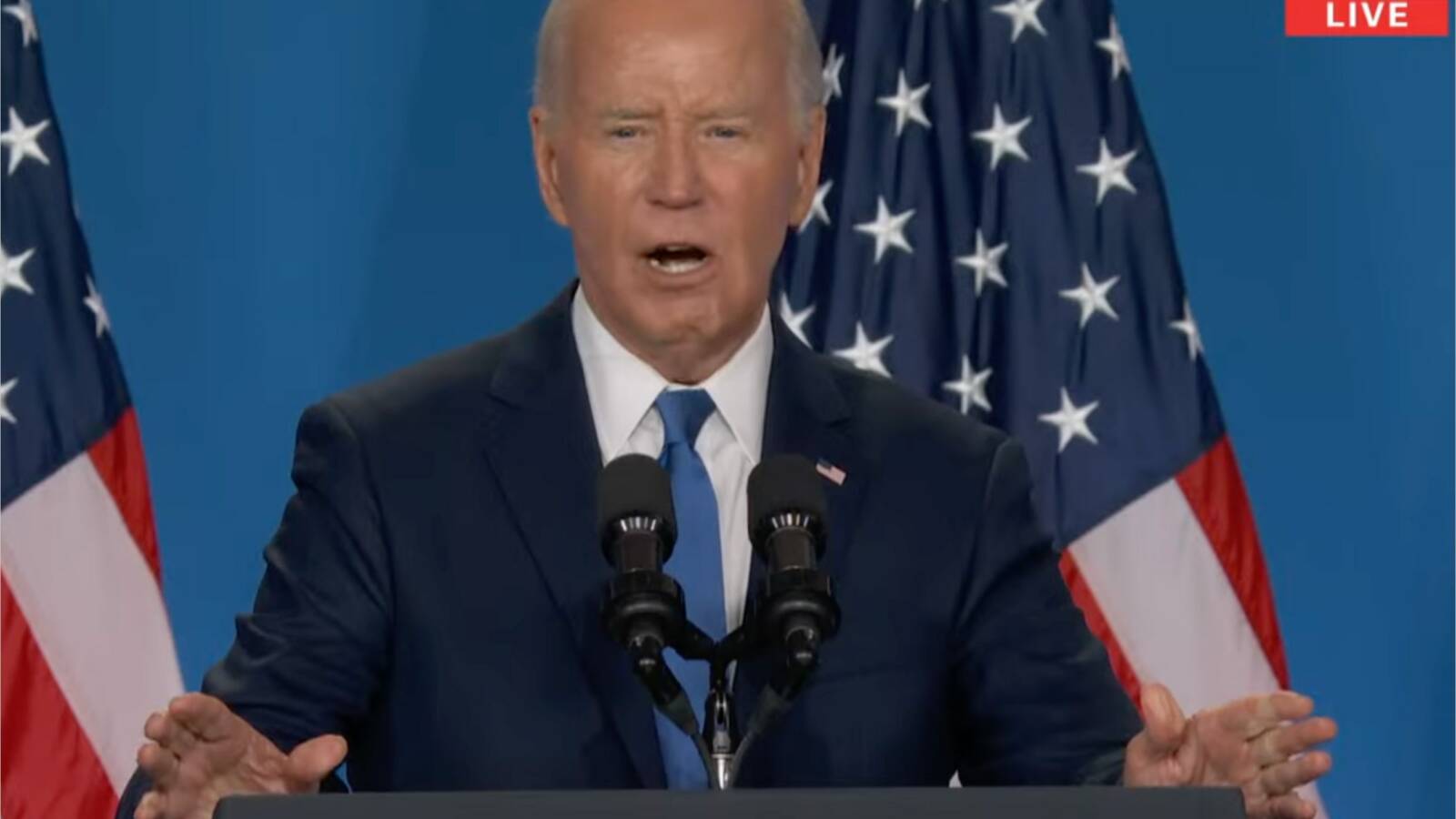One of my pet peeves is when people eat the last Nutter Butter and put the empty package back in the cupboard. But that’s not important right now. (Yes, I’m directly stealing Jonah Goldberg’s schtick.) But really, one of my pet peeves is when people use the phrase “beg the question” when they really mean “raise the question.”
When A1C Jack Teixeira accessed a bunch of documents marked “TS/SCI” from U.S. Air Force servers, printed them, took them home, photographed them, and put the images on a Discord channel filled with enough evidence of his actual identity, it does not beg the question of whether the USAF is competent at protecting secrets. However, it raises many questions on that topic, and by extension, a whole bunch of other topics.
“Begging the question,” in the formal sense (which is the only sense that matters for terms of art) is a philosophical term of art describing a particular logical fallacy. Grammarist defines it as making an incoherent argument: assuming the conclusion before offering an argument. People who do this are either arguing from ignorance or bad faith.
They use the point they try to prove as an argument or piece of evidence itself. You’ll often find this fallacy in political arguments among people who cannot exert effort in establishing a conclusion.
If I already believe that the USAF is incompetent at protecting secrets, and ask why the New York Times spent more time finding the leaker than asking how such secrets could be leaked in the first place without competent authority realizing it, then you’d be begging the question of the media’s role in partnering with certain elements of the government. Since Matt Taibbi already believes this, that’s exactly what he wrote.
If you really believe that Hunter Biden’s laptop is a bigger story than Donald Trump’s January 6th riot, then it would seem that the media is conspiratorially ignoring the Jim Jordan-Mike Morrell story because it exposes the totally secret truth that Democrats wanted Joe Biden to win in 2020. That’s what Matt Taibbi believes, because he pretty much wrote it.
I don’t want to pile on to Taibbi. I completely respect his skills as a journalist, and his life story playing Russian basketball while publishing an ex-pat semi-subversive journal in Russia, then, as an editor at Rolling Stone, labeling Goldman Sachs as “a great vampire squid wrapped around the face of humanity, relentlessly jamming its blood funnel into anything that smells like money” in the wake of the 2008 mortgage and banking crisis, is legendary.
Fighting that good fight against the cabal of billionaires chasing the last dollar to the ends of the earth from their Manhattan offices brings a certain kind of cynicism to a person, that can’t be learned any other way.
The same goes for the fellow traveller Glenn Greenwald, who founded The Intercept, with a mission to turn over every stone trod upon by government and big business, to expose the grubs, snakes, and dripping lichen these use to poison their enemies one by one. Of course, as a business, The Intercept could not tolerate an iconoclast like its founder, and he was defenestrated, to land at Substack (where he didn’t stay, moving to Rumble, the home of many Trump-aligned conspiracy flingers).
Greenwald was a First Amendment lawyer who really believed the opinions coming out of the Electronic Frontier Foundation, which abhors secrets, especially when they are possessed by western governments like the U.S. and the U.K. Greenwald’s many blogs, contributions to Salon and The Guardian, and his work with über-leaker Edward Snowden are an opus magnus of the “secrets are bad” wing of civil libertarians.
I think people like Taibbi and Greenwald are necessary for a healthy non-Orwellian society. But they are also walking bias confirmation machines for those who beg questions instead of raise them.
(To go down a rabbit hole, read Scientific American’s 2013 praise of Edward Snowden, who exposed a giant betrayal of the cryptography community and the cyber security industry’s integrity. The NSA helpfully provided a suite of software to implement sound cryptography that NIST pushed into a worldwide standard. But the NSA purposely hid a flaw in the software that allowed it to more easily crack material encrypted with it. It hid a backdoor that it then mercilessly used, under color of law, through President George W. Bush’s efforts to gather all the intelligence in the world in his “war on terror.” NIST, and the U.S. government, will never be trusted again to go anywhere near cryptographic algorithms, unless supported by a truly international consensus.)
Question-beggars are going to assume that of course the government will abuse any privilege granted to it to preserve the peace, root out evildoers, and maintain a decent society, because that particular brand of civil libertarians already believe that Ruby Ridge and Waco were inevitable, and the only solution is that all secrets belong to individuals, and none to the government.
Of course, taken to its logical conclusion, you get politicians like New Hampshire’s Meldrim Thomson, Jr., who once sought to arm the Granite State’s National Guard with their own tactical nuclear weapons. I grew up under Thomson, and while he could be endlessly entertaining for political types, the constant pot-stirring didn’t make for fun time for Seabrook teenagers like me trying to get to work when 10,000 protestors blocked the streets in protest of the nuclear plant being built there.
Question-begging is rampant. Democrats vehemently opposed civil rights right up until the 1960s when they flipped. Then Democrats thought they deserved the minority vote by pure fealty. When Hispanics began voting for Republicans, and some Black voters helped elect Donald Trump in 2016, it was seen as a betrayal, not the result of policies of the Democrats themselves. Biden had to apologize after telling radio host Charlamagne Tha God “If you have a problem figuring out whether you’re for me or Trump then you ain’t black” in 2020.
But if you are of a certain political persuasion, it’s not begging the question to ask why the New York Times spent 1,400 words covering the apology, which was delivered on a conference call attended to by maybe a thousand people (more likely just a few hundred), hastily joined and arranged by his campaign. The apology itself amounted to two sentences: “I shouldn’t have been such a wise guy. I shouldn’t have been so cavalier.” It’s obvious to such people that the NYT wanted Biden to win (it’s not ever arguable they were neutral).
What you only saw on the right is people asking why Biden felt entitled to be “cavalier” questioning Black voters motivations to vote for anyone but him.
During the 2020 campaign, some Democrats floated that absolute fringe conspiracy that Postmaster General Louis DeJoy was purposely slowing the mail to prevent absentee ballots from being received in time to be counted. In fact, DeJoy was acting on the previous PMG’s plan—Megan Brennan, an Obama appointee—to remove underutilized equipment and reapportion mail sorting to reduce costs. That got almost no play outside conservative blogs and news outlets. But Trump’s daily drumbeat of “stop the steal” got amplified by the mainstream media to giant proportions.
This all brings me to the Ouija board. Ouija boards are only good at one thing: confirming existing biases. If you believe something is already true, the Ouija board will confirm it for you. If you believe that you are in contact with supernatural forces that move your hands to provide messages from “beyond,” then you’re going to get just that.
If you believe that the Ouija board is going to make Mike “Pillow Guy” Lindell’s evidence of massive ballot tampering appear, then you probably already believe the evidence exists. This, despite the fact that a Trump-supporting computer expert won Lindell’s $5 million offer to “prove me wrong,” and was ordered by an arbitration panel to pay up.
If you already believe that “2000 Mules” really provided evidence of a giant conspiracy to produce fake absentee ballots and stuff collection boxes around the nation, then your Ouija board is going to tell you that it’s true.
If you already believe that President Joe Biden doesn’t really need pre-printed cards with the pronunciation of the reporter he’s supposed to call on, with the question about to be asked conveniently provided, then your Ouija board is going to tell you that the 80-year-old president’s mind is as sharp as when he first won his seat in the Senate in 1972, when Richard Nixon was completing his first term.
Everything we consume in media these days is designed to confirm our pre-existing biases. The entire slap-on-the-wrist Fox News got, and perhaps the next one too, was payment of a fine for the crime of bias confirmation. Tucker Carlson lost his job and his television slot, which he won’t even feel in his bank account for many years, if at all, because he told his audience what they already believed and made them feel smart for believing it. Carlson is a smart guy, no doubt, but he used his smarts to anesthetize people to facts, people who should be thinking for themselves, but instead used Carlson as their Ouija board.
Where things get interesting is when people like Taibbi and Greenwald, who both despise Trump, provide Ouija board confirmations for people who believe Trump is their avatar in a war against the Deep State. If you believe that the government itself, along with major media, big business, and folks who dislike Elon Musk, are in conspiracy to control the entire world, beginning with you, you’re probably reading your news from a Ouija board.
There’s two readings on the politics of Trump right now. One is that Trump can’t possibly win in 2024, so therefore Democrats are going to do everything possible to get him nominated. Of course, that ignores annoyances like Manhattan District Attorney Alvin Bragg’s case heading to court, or possible future indictments coming form the Department of Justice and Fulton County, Georgia D.A. Fani Willis. Like commercial fusion power, these future indictments always seem to be just around the corner but never arriving.
The other reading is Trump’s nomination is inevitable. Therefore the GOP should be driven off like Illinois Nazis. Depending on your Ouija board, you might buy either of these readings. Or you might look at the facts: both sides have charlatans, grifters, and political shills vying for your money, your vote, and your eyeballs (online). The current president is very old—older than Mick Jagger and Keith Richards, who have been touring longer than Biden’s been in politics. Donald Trump is the least-changed person in this entire cast: he’s the same now as he was in 1980.
It’s interesting to me that the only transcendent truth in politics now is that Trump is a constant. He’s always been a philandering, misogynistic, licentious, self-aggrandizing bore with a miracle cure, tasty steak, or prime real estate to huck. And he always leaves everyone doing less well than himself. The very possibility that he could end up behind bars has driven a cottage industry in American politics and media, just as much as the movement to put him back in the White House. Trump is the ultimate political Ouija board, and the glass always moves back to him, if you dare to play.
Even in faith, people play Ouija board games. Your opinion of religion is of great importance in your acceptance of the morals, truth, or doctrine of any particular faith. It’s not the opinion or pronouncements of religious figures that Paul relied upon in the New Testament epistles. In 1 Corinthians, he denied those things, writing “And because of him you are in Christ Jesus, who became to us wisdom from God, righteousness and sanctification and redemption, so that, as it is written, “Let the one who boasts, boast in the Lord.”
“And I, when I came to you, brothers, did not come proclaiming to you the testimony of God with lofty speech or wisdom. For I decided to know nothing among you except Jesus Christ and him crucified. And I was with you in weakness and in fear and much trembling, and my speech and my message were not in plausible words of wisdom, but in demonstration of the Spirit and of power, so that your faith might not rest in the wisdom of men[c] but in the power of God.” (1 Corinthians 1:30-2:5)
There’s only one true demonstration of religion, and that’s the power of God. Great preaching will increase the flock, frequently at the expense of other congregations, who run to the eloquent words of the new preacher. But preaching with power will produce converts, because they have witnessed the power of God, not the confirmation of their own biases.
Those who would not darken the door of a church because they are sick of Christians playing Ouija board games with their faith, will run into the church if they see a miracle with their own eyes, or with their own lives. And if God is God, then He will produce miracles. Jesus said, “Truly, truly, I say to you, whoever believes in me will also do the works that I do; and greater works than these will he do, because I am going to the Father.” (John 14:12)
It is no wonder that many evangelical Christians have fallen for the bias confirmations of their own beliefs. They haven’t seen a miracle in a while, if ever, and they’re attracted to the “lofty speech or wisdom” of the latest smooth preacher. And that preacher is reading his own Ouija board.
In 1 Samuel 28, King Saul visited a medium who was faking putting Saul in touch with the spirit of the dead prophet Samuel. The Bible recounts how God raised Samuel from the dead, which frightened them both, since neither expected it. Playing Ouija games with God is likely to bring nightmarish results. It’s best to count on solid teaching and the power of the Holy Spirit than many prophecies by people you don’t know.
It’s begging the question to say that God will do this, or that, or that God is happy with our politics, or our nation, or our political party. It’s begging the question to say that the problem with evangelicals is the way some worship, or “toxic masculinity,” or that Republicans expect the evangelical vote in the same cavalier way Biden counted on the Black vote.
Bias confirmation, blaming those with whom you disagree for promoting conspiracies with which you disagree, while promoting your own conspiracy theories, all without the logical evidence required to make a compelling argument, is nothing more than playing with a Ouija board.
The best way to avoid Ouija board pronouncements, of course, is not to play.
Follow Steve on Twitter @stevengberman.
The First TV contributor network is a place for vibrant thought and ideas. Opinions expressed here do not necessarily reflect those of The First or The First TV. We want to foster dialogue, create conversation, and debate ideas. See something you like or don’t like? Reach out to the author or to us at ideas@thefirsttv.com.







